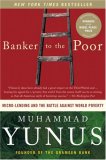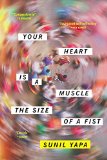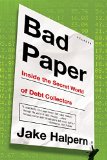Summary | Excerpt | Reviews | Beyond the book | Read-Alikes | Genres & Themes | Author Bio

Critics' Opinion:
Readers' Opinion:
First Published:
Jun 1999, 258 pages
Paperback:
Oct 2003, 288 pages
 Book Reviewed by:
Book Reviewed by:
BookBrowse Review Team
Buy This Book
From the book jacket: In 1983 Muhammad Yunus established Grameen, a
bank devoted to providing the poorest of Bangladesh with miniscule loans. He
aimed to help the poor by supporting the spark of personal initiative and
enterprise by which they could lift themselves out of poverty forever. It was an
idea born on a day in 1976 when he loaned $27 from his own pocket to forty-two
people living in a tiny village. They were stool makers who only needed enough
credit to purchase the raw materials for their trade. Yunus's loan helped them
break the cycle of poverty and changed their lives forever. His solution to
world poverty, founded on the belief that credit is a fundamental human right,
is brilliantly simple: loan poor people money on terms that are suitable to
them, teach them a few sound financial principles, and they will help
themselves.
The Grameen Bank and its founder, Muhammed Yunus, were jointly awarded the
2006 Nobel Peace Prize, which adds to the numerous other awards he, and the
Bank, have received over the years.
Comment: If most of us were asked to name the person most famous for
helping the poor people of the Indian subcontinent, we would probably reply
Mahatma Gandhi; but I suspect that if you walked into many a village in
Bangladesh today and asked the same question, the answer would be Muhammed Yunus,
founder of the Grameen Bank.
The Grameen Bank's loaning system is based on groups of five people who provide mutual, morally binding group guarantees in lieu of the
collateral required by conventional banks. At first only two members of a group
are allowed to apply for a loan. Depending on their performance in repayment the
next two borrowers can then apply and, subsequently, the fifth member as well.
This simple formula, supported by the 16 decisions that borrowers must agree to before taking a loan (see sidebar) have overturned many former assumptions, such as:
Research has indicated that the average household income of Grameen Bank
members is about 50% higher than the target group in a village that has
not been offered loans by Grameen, and about 25% higher than non-members living
in Grameen Bank villages. This has resulted in a sharp reduction in the
number of Grameen Bank members living below the poverty line: 20% compared to 56% for comparable non-Grameen Bank members. There has also
been a shift from agricultural wage labor (considered to be socially inferior)
to self-employment, which has had a positive effect on the employment and
wages of the remaining agricultural waged laborers. In other words what started as a
local initiative has grown to the point where it has made an impact on poverty at the national level.
Muhammad Yunus was born in 1940 in Chittagong, a seaport in Bangladesh. The
third of fourteen children, five of whom died in infancy, he was educated at
Dhaka University and was awarded a Fulbright scholarship to study economics at
Vanderbilt University. In 1972 he became the head of the economics department at
Chittagong University. He is the founder and managing director of the Grameen
Bank. For more information read his autobiography, Banker to The Poor, starting with the excerpt below, exclusively at BookBrowse!
![]() This review
first ran in the November 12, 2006
issue of BookBrowse Recommends.
This review
first ran in the November 12, 2006
issue of BookBrowse Recommends.

If you liked Banker to the Poor, try these:

Your Heart Is a Muscle the Size of a Fist
by Sunil Yapa
Published 2016
The Flamethrowers meets Let the Great World Spin in this electrifying debut novel set amid the heated conflict of Seattle's 1999 WTO protests.

by Jake Halpern
Published 2015
A vital exposé that is also a bravura feat of storytelling.





The Flower Sisters
by Michelle Collins Anderson
From the new Fannie Flagg of the Ozarks, a richly-woven story of family, forgiveness, and reinvention.

The House on Biscayne Bay
by Chanel Cleeton
As death stalks a gothic mansion in Miami, the lives of two women intertwine as the past and present collide.

The Funeral Cryer by Wenyan Lu
Debut novelist Wenyan Lu brings us this witty yet profound story about one woman's midlife reawakening in contemporary rural China.
Your guide toexceptional books
BookBrowse seeks out and recommends the best in contemporary fiction and nonfiction—books that not only engage and entertain but also deepen our understanding of ourselves and the world around us.